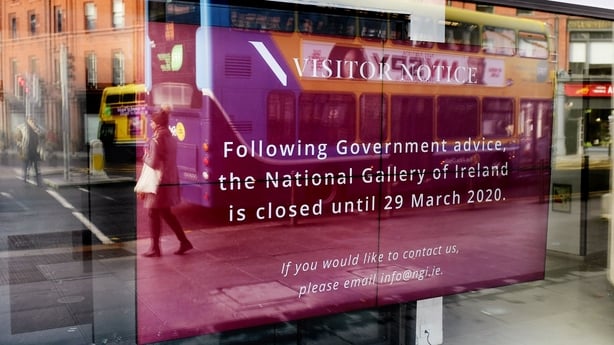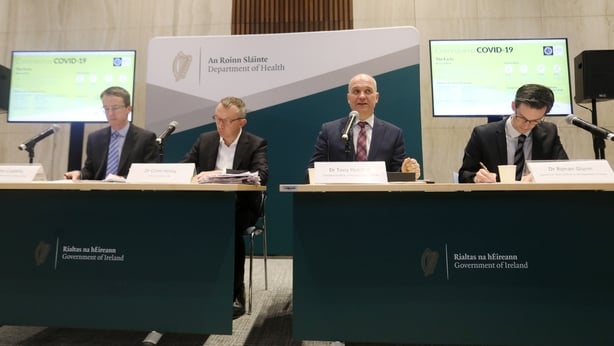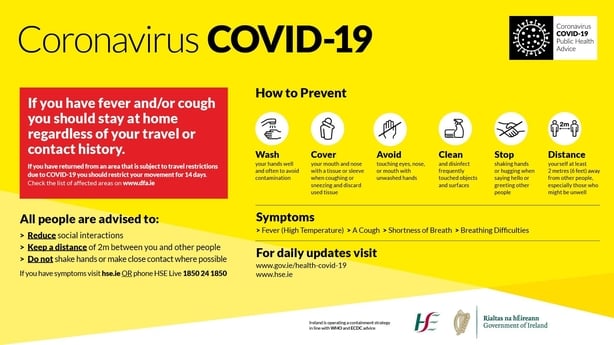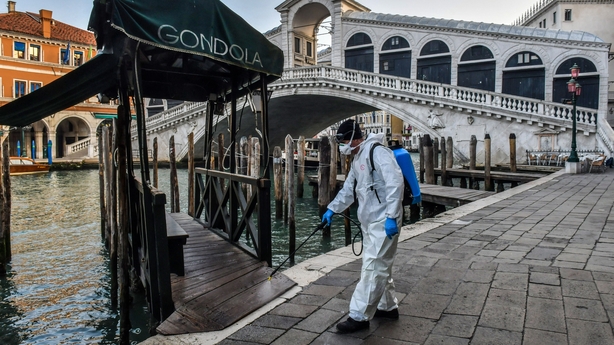This too will pass. There was a time, not so long ago, when we all lived and worked in a world that had never heard of Covid-19. Now it's a word that dominates conversations and daily routines, in a way that is almost unimaginable.
In another time and place, Covid-19 could just as easily have been the name of a new band, but it’s not and this virus sounds very different to what has come before it.
Just 15 days ago, Ireland reported its first case of the new virus. Now, there are more than 100 confirmed cases on the island of Ireland.
We are now using terms such as 'social distancing’, ‘respiratory etiquette’ and ‘close contacts’, that were not the stuff of common parlance last Christmas. At the start of all of this, my phone was trying to auto-correct these terms when I inputted them, as they were so unfamiliar. Now they are nearly part of the family of pronouns.
Ireland is in the delay phase. The number of cases is still quite low. We have a mix of travel-related cases from at-risk areas, some people who have been infected after coming into close contact with a confirmed case, including some healthcare workers and also community transmissions.
One of the concerning aspects has been the cluster of cases in certain areas, which had a notable part to play in the heightened alert last week and the widespread measures announced by Government on Thursday. This is a dynamic situation and measures will be introduced and adapted to suit the changing situation.

This virus will move through some of the population. But what is unclear is the exact impact it will have. How many might be infected and in how many cases will it be serious? We know that over 80% of cases are mild to moderate and most people will recover. It’s important to keep that to the fore. There are models and predictions and curve maps. None of this really explains the personal experience for families and especially the concerns for those who are particularly vulnerable.
Special consideration is needed for people over 75 years and those with underlying health conditions such as diabetes, coronary heart disease and chronic obstructive pulmonary disease (COPD). There are many other conditions too that place people at risk.
This is a time for solidarity between generations, looking out for one another, young or old. It’s a defining moment in relation to our humanity and ability to face down fears and anxieties and act on the science and in a calm manner.
With the phase we are now in, slowing down the virus is nearly as important as stopping it. If its progression can be slowed, then it becomes somewhat more manageable, although still like nothing the health service has ever seen before.
As Paul Reid, the head of the HSE said last week, this is unprecedented but he also noted how the HSE staff, so often the focus of criticism, have stepped up to the plate.
Spare a thought for the health staff working on the frontline and those behind that frontline. These people are at particular risk of infection and are essential to keeping the service running. So all efforts to minimise their exposure must be taken. Of course, it’s not just general hospital services that are on alert, but psychiatric and disability services too, where there are very vulnerable patients and residents. Likewise with nursing homes.
The task of covering Covid-19 from a journalistic perspective is an unprecedented challenge. As you can see, events move at such a pace, that one hour can be very different to the next 60 minutes. There are days when the confirmed case numbers rise modestly and other days when there is a steep jump.

One of the big elements to watch for is the ratio of positive to negative cases, in terms of the overall tests performed. Currently it is about 98% negative cases, which is good. We will see the scale of testing really increase from now on, with the revised criteria.
Now, if you have symptoms you should ring your GP or telephone the emergency department. Please be aware that testing will be arranged by your daytime family doctor, but not by out-of-hours GP services.
As the national public service broadcaster, RTÉ has put in place significant contingency plans to ensure coverage can continue during the various phases of the illness spread.
For that reason, a number of staff, like me for example, work away from the office, for health and safety considerations. It is probable that some staff will become infected. Reporters, camera crews, production and technical staff and managers help us get to air every minute, of every day. So this will be a big challenge in the weeks ahead. I am lucky to have a great correspondent colleague in George Lee and we currently cross cover each other, so that one of us can get a rest on certain days. This is a 24-hour, seven-day story and none of us know exactly when it may end and how.
For this story, along with the normal news and analysis on RTÉ television, radio and online, I have been using social media, in a bigger way than ever before. It’s been a valuable place, mostly for updates, hearing the views and questions people have and frankly a place too for solidarity and help where possible. It is especially useful when working remotely.
Social media does carry some disinformation, regarding the virus. It should be used to try to calm people and reduce anxieties. There are some very good healthcare professionals online and people who are not afraid to challenge officialdom and raise serious points.
In life, there are really no wrong questions but just bad answers. It’s good to question and of course, that is central to any journalist’s work. So keep asking me and George and we will do our best to put points to the experts.
I know from the existing and many new contacts I have made since this story began, that some people are reporting difficulties sleeping well at night. That’s understandable, as some people have genuine worries about their family members and friends, young and old and those with medical conditions that could place them unexpectedly in harm’s way. The best antidote is facts. Arm yourself with solid information and of course reduce the risks through taking the well-publicised advice on hand hygiene, good respiratory etiquette and social distancing.

St Patrick’s Day next Tuesday will be unlike any other in memory. The parades are cancelled. But it is a Bank Holiday and given the circumstances, there is the potential risk for some breakdown in adherence to social distancing and the general advice. The hope is common sense will prevail.
How different countries are dealing with this is fascinating. During the week, I received a communication from the South Korean embassy in Ireland about the efforts they are undertaking in their country.
What struck me was the huge volume of testing they have done - 1 in every 260 people tested, more than 50 drive in testing centres and smartphone applications to let people report on their health status to health authorities from home.
There, people who are close contacts of cases are not allowed to go abroad. There are special entry monitoring procedures for travellers from high-risk areas. Plus multi-step temperature checks at airports on all outbound passengers. Granted, these airport checks are not recommended by the European and World Health authorities. But in this public health crisis, some countries will do what they think is best.
But it does add to some of the head-scratching and confusion elsewhere as to why all countries are not taking such measures. It is also quite notable how the approach in Britain is different to our approach.
Here, the chief medical officer, Dr Tony Holohan, has explained the science behind each decision at the regular press conferences. Those media briefings are also streamed live on RTÉ News Now and usually happen between 5.30 and 7pm Monday to Friday. For that reason, often it’s while the 6.1 news is on air, we get the latest figures and bring them to you as soon as we can, with context. This is an incredibly fast moving story, with so many moving parts. So much so, that by the end of each day, the morning just gone is almost unrecognisable.
Among the biggest health news events I have covered have been the blood infection scandal in the mid 90s, the CervicalCheck crisis, which started in April 2018, and now this Coronavirus health emergency. Those other events had a devastating impact in their own way and the effects today are ongoing.
What sets the coronavirus story apart is that it is a world story, unfolding before our eyes. It is also now officially a pandemic, with Europe at the epicentre, according to the WHO.

In terms of impact, we are many weeks behind Italy, the UK and others. There is a positive aspect to that. It has given us time to prepare, including those stark measures announced by the Government, closing schools, universities, crèches and cultural buildings.
But life must go on as best it can, the shops remain open, so do pubs and restaurants and some employees are adjusting to working from home, where they can.
It seems like a different country. Dublin City was very quiet on Friday night as I was leaving the Department of Health after the 9 TV news. The department has become something of a second home for me, as I wait outside and go inside for the main TV and radio news bulletins and get to the media briefings.
There is a big media pack of colleagues too, many who no doubt also feel exhausted from day to day. This is as serious as it gets and so there is little time for the usual banter and chat as media deadlines approach.
At weekends, we get a statement on the latest figures here from the National Public Health Emergency Team. That team has effectively existed for many years and has dealt with other health events but it’s fair to say this is the biggest role it has played and it’s in the spotlight like never before. Each decision is parsed and analysed.
We should also be mindful of the pressures on senior Department of Health officials and HSE managers, who in the normal course of events, understandably come under fierce scrutiny and criticism. Their decisions at this time have consequences and they must make them in real time, but based on science, on evidence. Rumour, supposition, or unfounded claims should have no place in this crisis.
When it is over, there may be reviews into how various areas performed. There may be mistakes, as with all human endeavours. But because this is an unprecedented situation, there is no real guide map.
But there is the expertise of the World Health Organisation, the European Centre for Disease Control & Prevention and the training of our public health medicine staff, who have come into their own during this crisis. So there is a wealth of knowledge to draw on.
If the Italians are singing from balconies to beat the virus blues, let’s hope we see some sprinkles of good Irish luck too in the period to come. This journey ahead with Covid-19 - we take it together.






